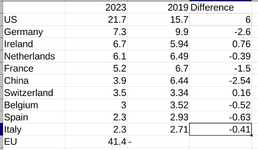An extra take.
From what I've seen of trades wars and scuffles so far, they don't seem to make a huge amount of difference to economic activity. Trump trade war 1, Brexit, sanctions on Russia.
There is wealth, which consists of raw materials, the services/labour that turns them to goods, goods, and digital services that are just a layer that operates above all the previous. Trade barriers just affect where that wealth flows.
When the UK formally left the EU, the mainstream were saying (and still do) that Britain is shooting itself in the foot. But we've since seen that the UK was pretty much the least bad performer of the G7 since. Meanwhile Germany has slipped into economic contraction - something which the MSM experts said would not happen. The UK had large trade deficits with a number of EU countries, primarily Germany. When the UK left the EU, it simply changed economic channels. Barriers mean wealth that would have left the UK either stayed in the country or went elsewhere. And Germany lost on exports.

This shows the difference in trade in the last year in the EU, compared with 2023 (4th year out). It shows the the percentage of trade with the EU and China fell by about 6%, and instead went to the US. Further, more wealth remained in the country, which I think is ultimately the most beneficial thing.
I find that MSM Western normies in particular are of the mind that you really have to rely on the world and how wealth comes into the country. Not surprising if you are as useless as the mainstream who have been loosing massively in everything for three decades. You don't hear or see much about generating new wealth, which shows a fundamental disconnect from economic reality. Wealth is created and destroyed in the pursuit of more wealth and leisure. Leaders need to focus on putting two and two together and making 4, rather than thinking hemorrhaging huge wealth to foreign often hostile nations is somehow good.
In the case of Russia, it was more dramatic, where we saw huge trade barriers erected that we were told would destroy Russia. But the wealth very quickly just moved in different directions, including via proxy to sanctioning states. Russian real GDP
grew in the following year and is above the previous trend line. Meanwhile the sanctioning states who cut themselves off from the basis of their industrial and technical economies (cheap Russian energy) have headed towards 0% growth and contraction (Germany); along with disposable income for many falling to zero and inflation.
No one knows how it is going to go with Trump's trade war. But I think this is less than the beating that Europe has taken over their idiotic COVID policies and self-inflicted energy wound. The US is ramping up energy production and is on the end of huge investment. It's also the center of the vast majority of the world's high-tech industries and that's guaranteed into the future. Exactly how they will fare with derustbeltification is more unclear for reasons listed above. But at the same time. GDP per capita is about $14k in China now. Manufacturing has already been going to Vietnam and elsewhere as China becomes less competitive at low-end manufacturing and more competitive on high-end manufacturing. And all of the countries you could reasonably have mid-IQ manufacturing bases in are also growing quite quickly. It makes sense that manufacturing can continually return to the US with more automation, as it already has been doing.
If you followed the words of Trump's top economics advisor Hassett, you will have seen that he outlined this:
1) trade war initiated
2) GDP to inch by in positive in Q1 (looks to be correct)
3) trade negotiations in early April
4) tax cuts and economic boosters
The realistic outcome is this shaves no more than 0.5% off of global GDP in year 1. If Trump plays his cards well, the loosers should be those who are exporting wealth and importing fiat. The winners will be those who can produce more wealth domestically and expand global trade. And it's the US that has trillions ear-marked for high-tech investments and a plan to expand trade via the trade war.




